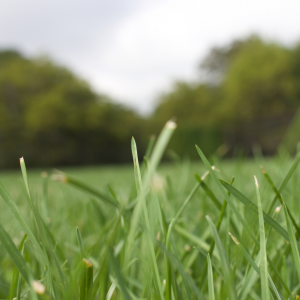 By the calendar, May is the time to start planting Hulled Bermuda grass. Bermuda seed germinates best when soil temperatures are above 75 degrees. After the soil is prepared, sow the seeds. The seeds should be covered with no more than .25 inches of soil. It will help if the cover soil is then lightly compacted (rolled). Keep the seedbed moist even if it requires watering several times a day. With ideal conditions, Bermuda usually germinates within a week or two. But there are many factors that can slow the germination; soil characteristics, temperature, and moisture being the top three. The above method applies whether you have bare dirt or existing grass. If you are over-seeding a lawn, you must first mow the lawn very short and remove as much thatch as possible before planting.
By the calendar, May is the time to start planting Hulled Bermuda grass. Bermuda seed germinates best when soil temperatures are above 75 degrees. After the soil is prepared, sow the seeds. The seeds should be covered with no more than .25 inches of soil. It will help if the cover soil is then lightly compacted (rolled). Keep the seedbed moist even if it requires watering several times a day. With ideal conditions, Bermuda usually germinates within a week or two. But there are many factors that can slow the germination; soil characteristics, temperature, and moisture being the top three. The above method applies whether you have bare dirt or existing grass. If you are over-seeding a lawn, you must first mow the lawn very short and remove as much thatch as possible before planting.
If this sounds like a lot of work, it isn’t. Preparing the soil means removing all unwanted plant growth and roughing up the surface. Sow the seeds with either a spreader or by hand (as evenly as you can). Cover the seed (.25 inch max) with compost or you can rake the seeds into the soil. Keeping the seedbed moist can be the hardest part of this task. If the seedbed dries out germination will be delayed.
Application rates for Bermuda grass seed range from 1/2# to 1# per 1,000 square feet. My rule of thumb is 1# for every 500 to 750 square feet. (If you are not pressed for time, you can use one seed per acre!). When you buy Bermuda seed (or any other seed) look at the seed tag for the “Pure Seed” and “Germination” ratings. Our common Bermuda seed is listed as 95/85. That means it’s 95% pure seed and 85 seeds out of 100 will germinate. Bermuda seed is expensive, so know what you are buying and the square footage of the area to be planted.
Wells Brothers handles 3 types of Bermuda grass seed. The most popular is hulled Common Bermuda. It is available in a 50# bag and by the pound. Arden 15 is a hulled and coated fairway type Bermuda that is available by the pound. Blackjack is a hulled and coated lawn Bermuda that grows dense and is dark green that also sells by the pound.
Bermuda Grass Seed Varieties:
- Common Bermuda Grass (hulled): Turf Type
Good all-around warm-season grass for turf, pasture, and erosion control. Low growing, disease, and insect resistance that once established, it is drought, heat, and salt-tolerant and will withstand a lot of abuse. Hulled means removal of the hull has occurred which helps speed germination, unhulled means hull remains.
Should be planted when soil temperatures are consistently above 60 F. It requires 6-8 hours of direct sunlight per day to do well and typically does best when mowed between 1.5 and 2 inches in height. Bermuda grass thrives on fertilizer. After your lawn is established you should apply fertilizer to Bermuda two to three times during the growing season.
Lawns 1-2 lbs. per 1000 sqft Pastures 10-15 lbs. per acre
- Blackjack Bermudagrass: Turf Type
Deep green in color, carpet-like density, good cold, drought, and traffic tolerant. Blackjack may be used on all premium turf applications such as golf course fairways, roughs, sports fields, and home lawns. Blackjack has proven well with color ratings in national Turf Trials and most locations. One unique quality is fast germination, up to 7 days faster than the similar Bermudas.
Should be planted when soil temperatures are consistently above 60 F. It requires 6-8 hours of direct sunlight per day to do well and typically does best when mowed between 1.5 and 2 inches in height. Bermuda grass thrives on fertilizer. After your lawn is established you should apply fertilizer to Bermuda two to three times during the growing season. A planting depth of 1/8 to ¼ inch is recommended.
Plant 2-3 lbs. per 1000 sqft
- Arden 15 Bermudagrass: Turf Type
Turfgrass with excellent color and superior early spring green-up. A two-clone intraspecific hybrid that provides a more uniform turf compared to other seeded cultivars. Arden 15 has an improved cold tolerance which makes it an ideal solution for planting in transitional markets as far north as Tulsa, Louisville, and Richmond. This variety has a faster grow-in versus Princess 77.
Plant 1-2 lbs. per 1000 sqft





